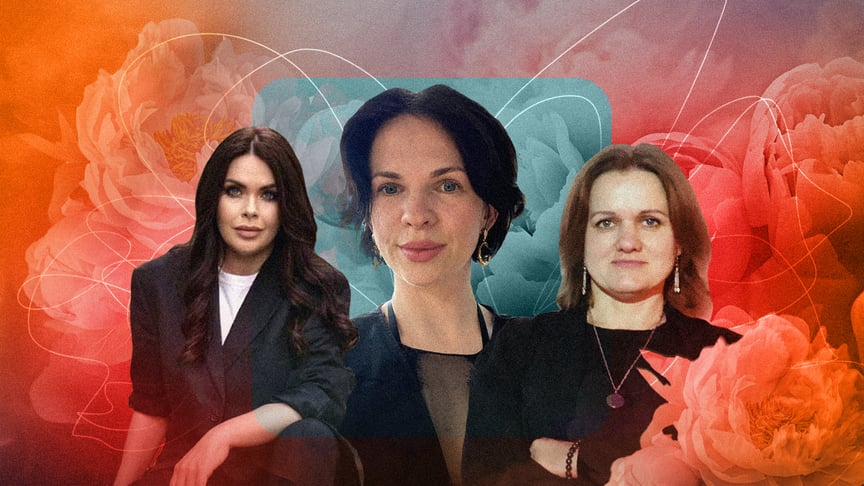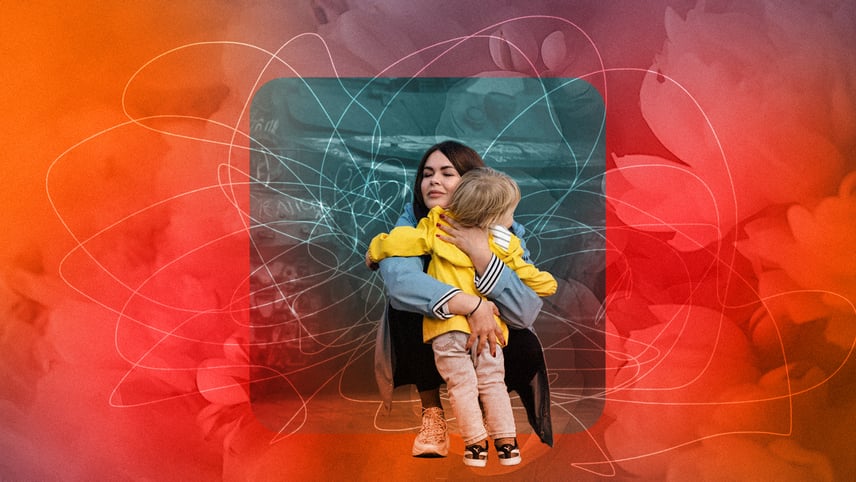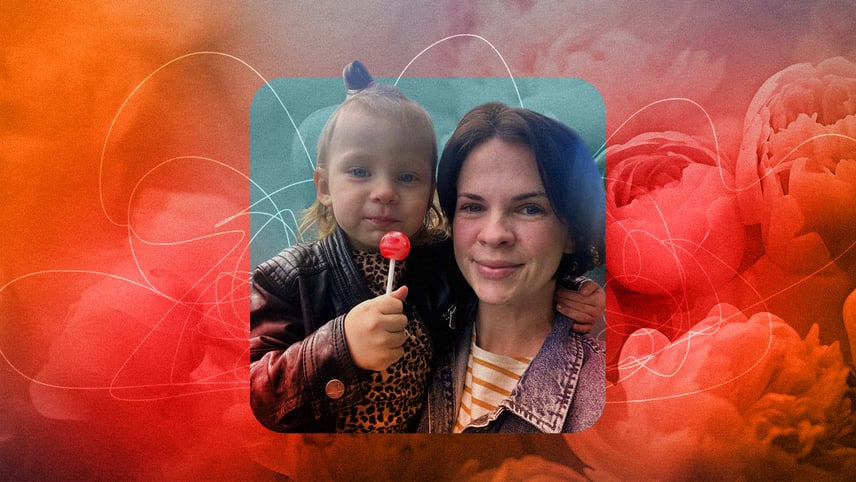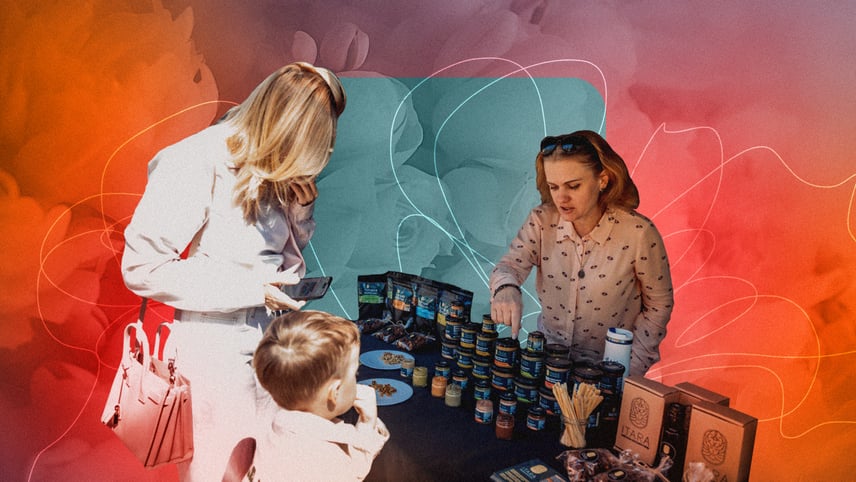Wartime childhood: stories of Ukrainian mothers

Being a mom during the war is a special challenge. Some accepted it consciously, choosing not to postpone motherhood until better times, but most did not realize that their sons' or daughters' childhood would be during a full-scale war.
To mark Mother's Day, together with the Children's Voices charity foundation, we shared the stories of mothers who, against all odds, have chosen a future for their children in Ukraine.
Olesya Ostafieva, co-owner of the witch bar "Lysa Hora", editor-in-chief of ProIT, author of the book Kira. The Road Home
When the Russians started the invasion, I was nine months pregnant. Although I am from Donetsk and have known what war is like since 2014, I did not believe that Russia would attack again and that their army would be able to approach the outskirts of Kyiv, and I did not plan any "backup options."
I met the morning of the invasion in Kyiv on the 25th floor. The building decided to turn off the elevator at night, and I have a dog and am nine months pregnant: it would have been difficult to go down to the shelter on foot. This convinced me to go to a village in Kyiv Oblast for a few days with the thought that I would return home for the weekend. I had my documents, money, and a minimum of belongings with me, but I did not know that I was going to have a long and difficult journey, about which I would later write a whole book.

The fact that I had to go west became obvious when the Russians bombed the maternity hospital where I was going to give birth. Then my sister and I just got in the car and drove away, not realizing where or how far. First, we got to Vinnytsia, then Drohobych. It was there that I first burst into tears. I had nothing for childbirth, and all the baby clothes for my daughter that I had so carefully searched for, ordered, and selected for quality and color remained in Kyiv.
My friend's mother, who hosted us in Drohobych, took me to the market to buy new stuff for the baby. In the only stall with children's clothes, I had to buy whatever they had there: totally ugly, of poor quality, and some things were clearly for boys. I felt so bitter that I burst into tears right in the middle of the market. It was probably the only moment when I was so overwhelmed with heavy emotions. I was mostly calm, even though I realized that I was losing a lot, and maybe even everything.
I decided to transit through Warsaw to go to the United States to my friend’s place to give birth. Getting to another continent was an extra-hard task: I was 38 weeks pregnant, and pregnant women are allowed to fly only up to 36 weeks. I did a trick: I wrote in the documents that I was 35 weeks pregnant and really hoped that I would not give birth on the plane. The airline asked for confirmation that I could fly, so I showed the ultrasound, where everything was in Ukrainian, and hoped that none of the employees would be able to read what was actually written there. Fortunately, it worked.
I gave birth to my daughter Kira in the United States two weeks later. But I definitely did not want to stay in America and build a future there. I believed that the war would end quickly and that my daughter and I would be home on Easter, April 24. Things turned out differently – our journey home from America lasted six months: Warsaw, a month in Albania, three in Italy, and finally Kyiv. After 12 countries and 25 cities, Kira and I ended up at home.
My daughter is still too young to ask about the war, she does not know about it. The other day we heard explosions, and Kira thought it was rain, she woke me up and said: "Mommy, it's raining, it's raining". I want to believe that when she grows up, there will be no more war and I won't have to answer uncomfortable and painful questions. I wrote a book about our return to Ukraine, but I did so very carefully. I understood that one day Kira would read it, and I wanted this story to be an inspiration for her at different ages.
As harsh and scary as it sounds, I also accepted the fact that I don't know how much longer I will be with my child. Any day anything can happen to me, which is why I value every minute we have together.

Natalia Chumak, a specialist in organizing leisure activities at the Kharkiv center of the Voices of Children foundation
When Russia launched its full-scale invasion, we had just celebrated our daughter Melania's first birthday. I will never forget the morning of Thursday, February 24. My child and I were staying with my parents in Lozova, 50 kilometers from Kharkiv, and in the morning, my husband was supposed to pick us up. He offered to come a day earlier, but I decided to stay another day. At 5 a.m., my husband woke me up by phone and said: "I'm not coming, the war has started". That's how my daughter and I met the full-scale invasion in Lozova, not in Kharkiv.
We had almost no belongings: clothes, toys were all left at home, but I still had the feeling that I was in the right place at the right time. I realized that I could be useful to someone, and the next day I went to volunteer while my mother stayed with her granddaughter.
Together with the locals, we sorted clothes, collected food and sent it to those who needed help in the war zone. My husband stayed in Kharkiv at the time and started evacuating people for free, and later I joined the process remotely. I would wake up at 5 a.m. and spend all my time on the phone: registering people, telling them at which checkpoint the buses would be waiting for them, answering all their questions. At some point, my fingers began to cramp from constantly typing on the phone, and I started sending voice messages.
I realized that the situation in Lozova was much safer, so I could help others. My mom was very supportive and took care of my daughter Melania. Thus we evacuated tens of thousands of people in two months. We spent almost all the money we had saved for our own apartment on gasoline.
And when the Russians started to advance from Izyum to Lozova, I realized that it was time for us to escape. We packed our belongings and headed west to Uzhhorod. On the way to the city, amidst the picturesque, tranquil landscapes, we received a text from a friend from Kharkiv. He said that our family business had been virtually destroyed after a Russian missile had struck nearby.
Therefore, we did not feel calmer in the safe region. My husband immediately went back to Kharkiv to save what was left of our business - the racing academy and the car simulator club. My daughter and I were accommodated by friends in a house with a total of 24 people. I remember that there were beds everywhere, some people even slept on the balcony. My daughter and I were given a separate room because the child was still very young.
It was painful at heart, I cried a lot. I was almost hysterical the whole day, and then I realized that I had to pull myself together because I had a child. I realized that my daughter shouldn't feel this panic, she should be comfortable, so that her psyche doesn't suffer.
When my husband returned to Uzhhorod, he bought me a fishing rod on the very first day. I would wake up at 5 a.m., and while everyone else was sleeping, I would go fishing for a few hours on the lake next to the house. There, I would relieve my pain and calm down.
At that time, many mothers came to Uzhhorod to escape the war with their children. They were immediately visible on playgrounds: sitting, crying, their faces swollen with tears. I went up to meet them. I realized that when a woman is in such a state, she has no time for a child, the kids are like the wind in the field. I gathered a lot of mothers around me: we started to organize discos for children, organized joint walks in the forest. I said: "Girls, come on, we need to get together, we need to think about our children. It's hard for all of us, but we have to live for the day."
I realized that my child had also suffered, but she was too young to tell me about it. So I picked up some paints and asked her to draw our life before the war and now. Melania saw the past as bright and colorful, while the reality was painted in black and red. I still keep these drawings. Then I realized that I had to pull the child out of this state, and first of all myself, because the child takes on the state of the mother most of all.
We stayed in Uzhhorod for six months, but all the time we wanted to go home. So as soon as Kharkiv became calmer, we decided to return. It was a blessing to be back in Kharkiv, in our home. There was much less shelling. Many families also returned, and the city began to revive. We found a private kindergarten for our daughter, and I started working with children at the Voices of Children charity foundation.
But in the last six months, the security situation in Kharkiv has changed a lot, when the city was bombed almost every day, I was struggling with myself. I would sit over the child all night, cover her, put pillows over her in case glass flew, then sleep for an hour or two and run to work. And so on all the time. So last month, we decided to take our daughter to her grandmother's house in the countryside, where it was much safer.
But my internal struggle did not stop. One day, I went to teach classes with children at the foundation and wondered if I had done the right thing by sending my child to her grandmother, or if I was a bad mother. I think that maybe I should have waited until things got better. And then suddenly, there was an explosion right next door. That's when I was finally convinced that I had done everything right. Two weeks after that, two S-300 missiles flew in front of our home. It was very hard for me to survive this attack, but every time I thought: how good it is that my daughter is in a safe place.
Every weekend I visit her, bring her stuff and goodies. And sometimes I wake up at 8 a.m. and get scared that we have overslept the start of the kindergarten. And only then I remember that my daughter is at her grandmother's. Traditionally, I go to the store, buy her some goodies, and by the end of the week, I have a whole suitcase packed.

Inesa Petukhova, co-founder of Itara, a craft nut snack company
I was afraid of the occupation more than anything else, so a month after the start of the full-scale war, we decided to leave Mykolaiv. The situation then was unstable: in the morning, Russians would enter the region, and by the evening, they would retreat. I went to Lviv, and then my older children sent me and my younger daughter further to Poland. The child was six at the time, she was just in the first grade.
In Poland, we were taken in by a family of pensioners who helped me with everything. In a month, I had all the necessary documents, my daughter was already attending a Polish school, and I was working. But I never thought for a second that I wanted to stay there. I realized that I am Ukrainian and I want my child to grow up in Ukraine, so we returned six months later. And it was a new challenge.
I had to adapt again, calm down, it was a difficult winter of blackouts. The family hadn't seen each other for six months, all with their own stresses: me after Poland, my husband after Mykolaiv. We decided not to return to our city, rented a house in a village in Lviv Oblast, and that spring I planted a garden for the first time in my life.
My daughter was graduating from the first grade for the second time, and my husband was working at different jobs. I realized that we all needed mental recovery and found free psychological help. We attended group and individual sessions at the local branch of the Voices of Children foundation. It helped us recover a bit, and we started thinking about what to do and how to take root here, in a strange place where we have no family or friends.
My husband had a hobby back in Mykolaiv, making snacks and walnut pastes, and in Lviv Oblast we decided to try to turn it into a small craft business. That year was filled with developing business plans, presentations, working with a designer, advertising as everything had to be learned from scratch. I started attending various trainings and learned about opportunities that I hadn't even suspected before. I was very inspired by the other women I met who never gave up.
Now we are slowly developing our own business, participating in fairs, and I attend business trainings. I am sure that there is no point in putting life on hold and waiting for everything to end, you have to live in spite of everything. My maternal instinct says that an apartment, a job, fear of the unknown - none of this matters if there is a threat to the child. Safety is the most important thing. But at the same time, I am very concerned about Ukrainians returning home from abroad. If we want to live in a developed, modern country, everyone has to do something for this on their own.
- Share: